King Charles III warns, yet assures, as he opens Canadian parliament
King Charles III made references to US President Donald Trump’s threats against Canada in remarks to its parliament.
Source link
King Charles III made references to US President Donald Trump’s threats against Canada in remarks to its parliament.
Source link
Trump’s latest comments come as China, North Korea, Russia say the Golden Dome missile defence system will create ‘space arms race’.
United States President Donald Trump says he has told Canada it will have to pay $61bn to be part of his proposed Gold Dome missile defence system “if they remain a separate, but unequal, Nation”.
In a post on TruthSocial, Trump claimed Canada “very much wants to be part of our fabulous Golden Dome System” and would gain free access if it joins with the US.
Participating in the proposed defence system would cost Canada “ZERO DOLLARS if they become our cherished 51st State”, Trump said, adding, “They are considering the offer!”
Trump’s post came just hours after Canada’s parliament hosted the UK’s King Charles III for a rare royal speech in which the monarch emphasised Canada’s sovereignty in “dangerous and uncertain” times, and amid the US president’s exhortations for the country to become part of the US.
Following the king’s speech, Canadian Prime Minister Mark Carney told Canadian Public broadcaster CBC that he hopes Canada will join ReArm Europe by July 1, in an effort to reduce dependence on the US for weapons.
Canada did not immediately respond to Trump’s latest comment, but Carney has previously confirmed his country has held “high-level” talks on the defence system issue with the US.
In total, Trump has claimed the Golden Dome system will cost some $175bn and would be completed by the end of his current term in 2029, although defence industry experts have questioned the feasibility of this timeline and budget.
Trump is hoping to secure an initial $25bn funding for the system through the sweeping “Big, Beautiful Bill” which is next to go up for a vote in the Senate after narrowly passing the Republican-controlled US House of Representatives last week.
The bill boosts spending on the military and border enforcement while cutting funding for social programmes, including Medicaid and food assistance that helped tens of millions of low-income Americans.

The Golden Dome is modelled after Israel’s Iron Dome, which also receives significant funding from the US, including $500m per year for its upkeep.
It is unclear how Trump would scale up the Iron Dome to cover the entire US, since Israel is only about the size of New Jersey, one of the smaller states in the US.
The Iron Dome is also designed to target short-range missiles, with a range of 1,000km (about 620 miles), while the main threat to the US would likely come from long-range ballistic and hypersonic missiles.

China, North Korea and Russia have all criticised Trump’s plan to put weapons in space, which the US president described in detail for the first time last week.
China’s Ministry of Foreign Affairs swiftly responded, with spokeswoman Mao Ning saying the plan “heightens the risk of space becoming a battlefield, fuels an arms race, and undermines international security”.
“The United States puts its own interests first and is obsessed with seeking its own absolute security, which violates the principle that no country’s security should come at the expense of others,” Mao Ning said.
North Korea’s Ministry of Foreign Affairs also responded, saying the US is “hell-bent on the moves to militarise outer space”.
Russian Foreign Ministry spokeswoman Maria Zakharova said on Tuesday that the Golden Dome project undermines the foundations of “strategic stability” as it involves the creation of a global missile defence system.
According to Russia’s state news agency TASS, Zakharova said developing the Golden Dome would also lead to development of the “means of pre-launch missile destruction and infrastructure that ensures their use”.
“This is already a literal manifestation of the US’s highly dangerous doctrinal course toward delivering so-called preventive, but essentially first strikes,” she said, warning it would turn space into a “weaponised environment” and an “arena of armed confrontation”.













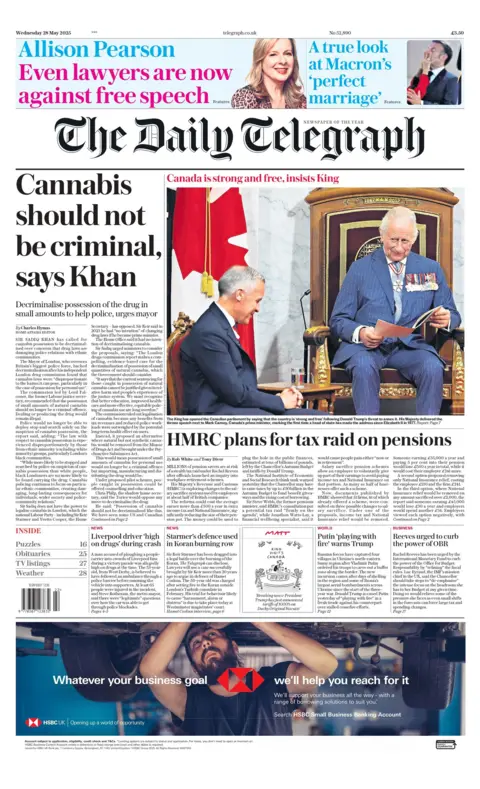

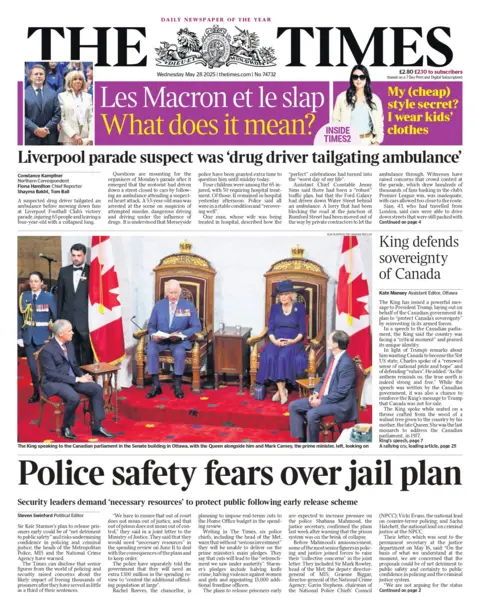



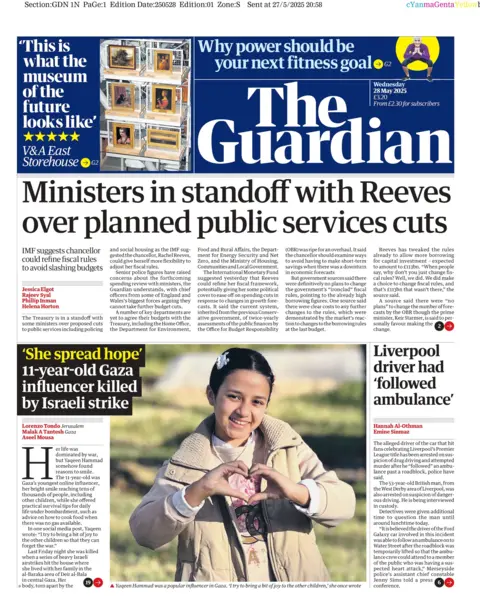
The Daily Mail, the Daily Express and The Sun lead on the man suspected of driving into crowds in Liverpool being questioned on suspicion of offences including drug-driving. The Express describes how a steward correctly allowed an ambulance to pass by a road-block before a Ford Galaxy “raced through” behind. The Sun’s editorial praises the police for revealing the ethnicity of the suspect within hours and backs calls for “full consistency” the next time there is a tragic incident or terror attack.
The main story for The Times is a letter from police and security chiefs to ministers raising concerns about plans to release some prisoners early to ease pressure on jails. A source tells the paper that although there have been changes to sentencing announced since the letter was written, the thrust of their concerns remains the same.
The Treasury is in a standoff, according to The Guardian, with some ministers over possible cuts to social housing and policing in next month’s spending review. The paper says the Home Office and the housing ministry are among the departments yet to agree their budgets. The paper highlights the suggestion yesterday, by the International Monetary Fund, for the chancellor to consider refining her fiscal framework, to allow for shallower spending cuts. But government sources insist there will be no change to the rules and point to the high cost of borrowing. The Financial Times, leading on the debt market, says fiscal pressures are forcing the Treasury to shift to borrow in the shorter term to try to bring down the bill on interest payments.
The i Paper carries a warning from economists, that the policies announced by Reform UK leader Nigel Farage yesterday would risk “mini-budget style market chaos”. One explains that gap between Reform’s savings target and what is reasonably practical is about £75bn, double the un-costed commitments proposed by Liz Truss.
The Daily Telegraph focuses on the call by the Mayor of London, Sir Sadiq Khan, for the possession of cannabis in small quantities to be de-criminalised. The paper points out that the mayor does not have the power to make such a change and figures in the national Labour party, including the prime minister, remain opposed.




US President Donald Trump says Russia’s Vladimir Putin is ‘playing with fire’ and Russia has so far been shielded from ‘really bad things’.
A senior Moscow security official has rebuked United States President Donald Trump and raised the danger of another world war breaking out after Trump said Russian leader Vladimir Putin was “playing with fire” by refusing to engage in Ukraine ceasefire talks with Kyiv.
Dmitry Medvedev said World War III was the only “REALLY BAD thing” in a response, late on Tuesday, to Trump, who had earlier posted a message to Putin on social media saying that “really bad things would have already happened in Russia” without his intervention.
“What Vladimir Putin doesn’t realise is that if it weren’t for me, lots of really bad things would have already happened in Russia, and I mean REALLY BAD. He’s playing with fire,” Trump said in a post on his platform Truth Social.
Medvedev responded on the platform X: “Regarding Trump’s words about Putin ‘playing with fire’ and ‘really bad things’ happening to Russia. I only know of one REALLY BAD thing — WWIII.”
“I hope Trump understands this!”
Regarding Trump’s words about Putin “playing with fire” and “really bad things” happening to Russia. I only know of one REALLY BAD thing — WWIII.
I hope Trump understands this!— Dmitry Medvedev (@MedvedevRussiaE) May 27, 2025
Currently the deputy chairman of Russia’s Security Council and a key Putin ally, Medvedev served as the Russian president between 2008 and 2012, and is known for his sabre-rattling comments.
He has repeatedly warned throughout the course of Russia’s war on Ukraine that Moscow could use its nuclear arsenal.
Putin also raised the possibility of nuclear confrontation in a state of the nation address in March 2024, warning Western powers of Russia’s nuclear capabilities should any decide to deploy troops in support of Ukraine.
“Everything that the West comes up with creates the real threat of a conflict with the use of nuclear weapons, and thus the destruction of civilisation,” Putin said at the time.
Medvedev’s public rebuke of Trump also comes after the US president said in a post on Sunday that Putin had “gone absolutely CRAZY” by carrying out extensive aerial attacks on Ukraine despite widespread calls for a ceasefire and Washington’s frustrated attempts to broker a peace accord.
“I’ve always had a very good relationship with Vladimir Putin of Russia, but something has happened to him,” Trump posted on Sunday.
Trump also told reporters he was considering new sanctions on Russia amid the impasse in ceasefire talks.
The war of words on social media comes as hopes for a swift end to Russia’s war on its neighbour dim. Kyiv suffered another battlefield setback on Tuesday, with Russian forces capturing four villages in Ukraine’s northeastern Sumy region.
Sumy Governor Oleh Hryhorov wrote on Facebook that the villages of Novenke, Basivka, Veselivka and Zhuravka had been occupied by Russia, although residents had long been evacuated.
Russia’s Ministry of Defence said on Monday that it had also taken the nearby village of Bilovody, implying a further advance into Ukrainian territory, as the more than three-year war grinds on.
Ukrainian officials have said for weeks that Russian troops are trying to make inroads into the Sumy region, the main city of which lies less than 30km (19 miles) from the border with Russia.
Russian forces, attacking in small groups on motorcycles and supported by aerial drones, have been widening the area where they have been carrying out assaults on the front line, a spokesperson for Ukraine’s border guard service said.
Ukrainian forces last year used the Sumy region as a launchpad to push into Russia’s neighbouring Kursk region, where they captured a vast area of territory before being driven out by Russian forces last month.
DEVELOPING STORYDEVELOPING STORY,
The ninth launch of Elon Musk’s futuristic SpaceX Starship comes after two previous space rockets blew up.
Billionaire Elon Musk’s commercial space flight company, SpaceX, lost control of its ninth Starship test flight 30 minutes after the uncrewed rocket vehicle was launched into space from Texas, the Reuters news agency reports.
The Starship then re-entered the atmosphere earlier than planned on Wednesday after an onboard leak triggered uncontrollable spinning in space, according to Reuters.
The test flight flew beyond the point of past failures, before losing control, Reuters added.
In a post on social media, SpaceX said the Starship experienced a “rapid unscheduled disassembly”.
“With a test like this, success comes from what we learn, and today’s test will help us improve Starship’s reliability as SpaceX seeks to make life multiplanetary,” the company added.
Musk has spent billions of dollars on Starship’s development. The South African-born billionaire claims the initiative is part of his commercial space flight company’s plan to colonise the planet Mars.
The latest test launch comes after a SpaceX Starship exploded shortly after takeoff on March 6.
The US Federal Aviation Administration (FAA) diverted several flights and briefly halted departures at four Florida airports, including Miami International Airport, as debris from that failed flight fell in the area.
Judge Julieta Makintach was accused of participating in a documentary about the famed football player’s death.
One of the three judges presiding over a negligence trial related to the death of Argentinian football player Diego Maradona has resigned, leaving the case’s future uncertain.
On Tuesday, Judge Julieta Makintach announced she would recuse herself after reports emerged that she had participated in a documentary about Maradona’s death and its aftermath.
“This is a judicial tragedy,” said Fernando Burlando, a lawyer for Maradona’s eldest daughters, Dalma and Gianinna.
Judges are largely forbidden from taking part in interviews and other public commentary while proceedings are ongoing. Since March 11, Makintach has been part of a three-judge panel weighing the fate of seven healthcare workers who tended to Maradona during his final days.
The seven have been charged with negligent homicide following Maradona’s death by cardiac arrest in 2020 at age 60.
It is a high-profile case that has stirred a great deal of scrutiny in Argentina. Maradona is a national hero, having led the national football squad to a World Cup victory in 1986.
His performance in that year’s World Cup tournament has since become the stuff of sporting legend. Even a foul he committed during the quarterfinal has been dubbed the “Hand of God”, since it led to an Argentinian victory over England – a rival with whom the country had an ongoing territorial dispute.
In 2000, the football governing body, FIFA, named Maradona one of its two “Players of the Century”, alongside Brazil’s Pele.
But Maradona struggled with addiction, and he passed away shortly after undergoing brain surgery for a blood clot. The circumstances of his death, in turn, led to questions about whether the football player received adequate medical care in his final days.
The seven defendants include a neurosurgeon, a psychiatrist, nurses and other healthcare professionals who attended to him. They face up to 25 years in prison if convicted. An eighth person is expected to face court separately.
More than 190 witnesses are expected to testify against the seven main defendants. One coroner already told the court in March that Maradona’s death “was foreseeable” and that the football player likely died in “agony”.
But the trial was brought to a halt last week when one of the key defendants, Leopoldo Luque, called for Judge Makintach to be removed from the bench.
Luque was a neurosurgeon and a personal doctor to Maradona when he died. Luque’s lawyer, Julio Rivas, told the court that his client had been approached by the BBC, a British news company, to take part in the documentary.
Through that interaction, Rivas explained they found out that the documentary’s production company had ties to Judge Makintach’s brother, Juan Makintach.
Police also indicated that they had seen a camera in the courtroom, allegedly approved by Judge Makintach.
On May 20, prosecutor Patricio Ferrari called for the trial to be paused for a week while the incident was reviewed. Footage was presented to the court from the documentary, showing the start of the trial. It appeared to feature the judge as a central figure.
Judge Makintach has denied wrongdoing. But Ferrari argued, “The situation compromises the prestige of the judiciary.”
It is unclear whether a new judge will replace Makintach in the coming months.

 Dukas/Universal Images Group via Getty Images
Dukas/Universal Images Group via Getty ImagesTesco’s introduction of AI technology to some self-checkouts has led to customers joking that it bears a striking resemblance to the Video Assistant Referee (VAR) technology used in football.
The supermarket is aiming to reduce shoplifting by installing overhead cameras to identify when shoppers fail to scan an item properly, and then showing a live-action replay of the item not scanning.
While some shoppers mocked the tech, others complained it was a step too far, with some saying they would not use self-checkout again.
The move comes after shoplifting in the UK hit a record high in 2024.
Figures from the Office for National Statistics show that shoplifting offences recorded by police in England and Wales rose 20% last year to 516,971.
But the number of thefts recorded by retailers themselves is even higher. Figures from the British Retail Consortium suggest there were 20.4 million thefts in the year to last September, up 3.7 million on the year before, costing retailers £2bn.
Tesco said it had rolled out the technology across some of its stores in a bid to help customers using self-service checkouts to identify if an item hasn’t scanned properly.
The supermarket said it would make the checkout process “quicker and easier”.
If an item fails to scan, customers are shown a video on the self-service screen of their attempt, accompanied by a message saying “The last item wasn’t scanned properly. Remove from bagging area and try again.”
It follows a similar move by Sainsbury’s, which has rolled out AI recognition technology at self-service checkouts at some of its stores.
“We regularly review the security measures in our stores and our decisions to implement them are based on a range of factors, including offering our customers a smooth checkout experience,” said a Sainsbury’s spokesperson.
“VAR Decision – Tuna Disallowed,” joked one commenter on a video posted on Instagram showing the technology flagging an item that had failed to scan properly, which has had more than 3.5 million views.
“Clearly off side,” added another.
But on Bluesky, a user voiced fears that the technology could open the door to more surveillance measures. “What’s next? Drones to follow… you about the store?”
On Facebook, another user said he would “not use self-checkouts” after the technology was introduced.
The move marks the latest attempt by retailers to try to stem the rise in shoplifting.
Tesco has also introduced giant trolley scales at its Gateshead store, which prompted a similarly mixed response from shoppers earlier this year.
“Am I at border control or Tesco?” asked one Reddit user.
Last week Greggs announced that it will move its self-serve food and drinks behind the counter at sites where there are high levels of theft.
And in 2023, photos circulating on social media showed supermarkets had fitted products including steaks and cheese with security tags, while coffee was replaced with dummy jars.
Latest Trump administration move comes amid a wider pressure campaign against top universities, and targeting of students.
The administration of United States President Donald Trump is temporarily suspending the processing of visas for foreign students, according to an internal memo from Secretary of State Marco Rubio.
The cable, widely reported by US media on Tuesday, ordered embassies and consulates not to allow “any additional student or exchange visa… appointment capacity until further guidance is issued”.
It added that the State Department “plans to issue guidance on expanded social media vetting for all such applications”.
The move is the latest blow to foreign nationals seeking to study in the US, as the Trump administration intensifies pressure on universities and students alike.
The administration last week revoked Harvard University’s approval for enrolling international students, amid a wider standoff over the school’s response to pro-Palestine protests and its diversity programmes. A federal judge has temporarily blocked the move.
The processing pause also comes as Rubio has sought to rescind hundreds of visas for foreign students, citing minor legal infractions or pro-Palestine speech or advocacy.
Speaking on Tuesday, US State Department Spokesperson Tammy Bruce did not directly respond to the cable, but said broadly, “We take very seriously the process of vetting who it is that comes into the country.”
“It’s a goal, as stated by the president and Secretary Rubio, to make sure that people who are here understand what the law is, that they don’t have any criminal intent, that they are going to be contributors to the experience here, however short or long their status,” she said.
Bruce added that those applying for student visas should continue to proceed normally, but should expect higher scrutiny.
“If you’re going to be applying for a visa, follow the normal process, the normal steps, [and] expect to be looked at,” she said.
Rubio’s cable did not give a timeline for the suspension, but told diplomatic staff they should receive guidance in the “coming days”.
The Trump administration’s actions towards higher education have raised thorny constitutional questions about academic freedom and the rights of individuals living in the US on temporary visas.
Last week, Rubio told lawmakers in the US Senate that he had revoked “thousands” of visas since Trump took office on January 20, although a full accounting has not been released.
Rubio has relied on an obscure law that the administration maintains grants broad powers to remove foreigners whose presence in the US they deem to be counter to US foreign policy interests.
Lawyers for several students targeted by Rubio for their pro-Palestine views – including Mahmoud Khalil, Rumeysa Ozturk, Mohsen Mahdawi and Badar Khan Suri – have maintained that their clients’ freedom of speech rights are being trampled.
Meanwhile, Harvard University has also said the Trump administration is violating its rights by cutting funding and revoking its ability to enrol foreign students.
US media also reported on Tuesday that Trump’s administration was expected to soon sever the remaining federal contracts with Harvard, in what would be the latest escalation.
More aid distribution sites are being set up in Gaza with US support, according to Israeli Prime Minister Benjamin Netanyahu. He described “some loss of control” after Palestinians desperately swarmed a new aid hub in Rafah following nearly three months of Israeli blockade.
Published On 27 May 202527 May 2025
Legislation likely to eventually pass as polls say 90 percent of French in favour of laws that give people with terminal diseases the right to die.
France’s lower house of parliament has approved a right-to-die bill in the first reading, taking an initial step in the lengthy process to pass legislation.
A total of 305 lawmakers in the National Assembly approved the legislation on Tuesday while 199 deputies voted against the bill to grant patients medical assistance to end their lives in defined circumstances.
The text has the backing of President Emmanuel Macron but is opposed by some conservative groups.
In a statement on X, Macron praised the approval of the bill as “an important step” on “the path of fraternity”.
“The National Assembly’s vote on legislation concerning the development of palliative care and assisted dying is an important step,” Macron posted. “With respect for sensitivities, doubts and hopes, the path of fraternity that I hoped for is gradually opening up.”

The legislation will be sent to the French Senate for further debate. Months could be required to schedule a definitive vote on the measure, given France’s long and complex parliamentary process. The National Assembly has the final say over the Senate.
The legislation is expected to eventually pass as polls indicated that more than 90 percent of French people are in favour of laws that give people with terminal diseases or going through interminable suffering the right to die.
The proposed measure defines assisted dying as allowing people to use lethal medication under certain conditions. They may take it themselves, or those whose physical conditions don’t allow them to do so alone would be able to get help from a doctor or nurse.
To benefit, patients would need to be over 18, be French citizens or live in France.
A team of medical professionals would need to confirm that the patient has a grave and incurable illness “at an advanced or terminal stage”, is suffering from intolerable and untreatable pain, and is seeking lethal medication of their own free will.
Patients with severe psychiatric conditions and neurodegenerative disorders such as Alzheimer’s disease will not be eligible.
A person would initiate the request for lethal medication and confirm the request after a period of reflection.
If approved, a doctor would deliver a prescription for the lethal medication, which could be taken at home, a nursing home or a healthcare facility.
A 2023 report indicated that most French citizens back legalising end-of-life options, and opinion polls showed growing support over the past 20 years.
Initial discussions in parliament last year were abruptly interrupted by Macron’s decision to dissolve the National Assembly, plunging France into a months-long political crisis.
Over the past 12 months, Draper has enjoyed a steep rise and achieved a series of notable career landmarks.
He has moved into the world’s top five after reaching his first Grand Slam semi-final at last year’s US Open, winning ATP titles on grass and hard courts, as well as reaching his first clay-court final in Madrid last month.
Observers with a deep understanding of the game have long insisted Draper has the ability to perform well on the red dirt, with British former world number four Tim Henman telling BBC Sport recently his best attributes – his left-handed serve and crunching forehand – could “work on any surface”.
Once he got going against Bellucci, Draper proved that again.
Cutting out double faults helped his first serve became increasingly dominant – climbing from 58% of points won with the opening shot in the first set to 92% in the second – while the volume of forehand winners also increased.
The venom of this shot was too hot for Bellucci to handle – and wowed the Paris crowd, who regularly gasped at Draper’s power and accuracy.
Another forehand zinger on his first match point clinched victory and a second-round meeting with either France’s Gael Monfils or Bolivia’s Hugo Dellien on Thursday.
Trump Media says the money will be used to create a ‘Bitcoin treasury’.
The Trump Media and Technology Group will raise about $2.5bn to invest in Bitcoin, United States President Donald Trump’s social media firm says, as it looks to diversify its revenue streams with a push into the financial sector.
The company is raising the funds by selling $1.5bn in stock at its last closing price and $1bn in convertible notes priced at a 35 percent premium, it said in a statement on Tuesday. The money will be used to build a “Bitcoin treasury”, the company said.
The Bitcoin will be held on Trump Media’s balance sheet alongside existing cash and short-term investments totalling $759m at the end of the first quarter. Crypto platforms Anchorage Digital and Crypto.com are to provide custody for the Bitcoin holdings.
“We view Bitcoin as an apex instrument of financial freedom,” Trump Media CEO Devin Nunes said, hailing the move as a “big step forward” in the company’s plan to acquire “crown jewel assets consistent with America First principles”.
Shares of the company behind Truth Social, a streaming and social media platform, were down 6 percent in early trading.
Trump Media has been exploring potential mergers and acquisitions as it aims to diversify into financial services.
Last month, it reached a binding agreement to launch retail investment products, including cryptocurrency and exchange-traded funds aligned with Trump’s policies.
The Trump family, long rooted in skyscrapers and golf clubs, has opened multiple beachheads in cryptocurrencies, quickly gaining hundreds of millions of dollars. Its other crypto forays include Trump nonfungible tokens (NFTs), a meme coin, a stake in a newly formed Bitcoin producer called American Bitcoin and the cryptocurrency exchange World Liberty Financial.
But the crypto push has attracted scrutiny from lawmakers, including Democratic Senator Elizabeth Warren, who last month asked the US securities regulator about its plans to supervise exchange-traded funds (ETFs) due to be launched by Trump Media.
Trump, who referred to cryptocurrencies in his first term as “not money”, citing their volatility and a value “based on thin air”, has shifted his views on the technology.
During an event at his Mar-a-Lago club in Florida during his presidential campaign in May 2024, Trump received assurances that crypto industry backers would spend lavishly to get him re-elected.
Last week, Trump rewarded 220 of the top investors in one of his other cryptocurrency projects, the $Trump meme coin, with a swanky dinner with him at his luxury golf club in northern Virginia, spurring accusations that the president was mixing his duties in the White House with personal profit.
The high court has declined to hear a bid to block a project that Indigenous groups say would destroy a site of religious significance.
The United States Supreme Court has declined to weigh a bid from a Native American advocacy group to block the construction of a large copper mine on land that many Apache people consider sacred.
The court turned down an appeal by the group Apache Stronghold on Tuesday, keeping in place a lower court’s ruling that would allow the project to move forward.
At the heart of the case is a stretch of federal land in the Tonto National Forest, part of the western state of Arizona.
The San Carlos Apache tribe know the land as Oak Flat — or Chi’chil Bildagoteel in the Apache language. Members of the tribe point out that the land, with its ancient groves of oak, has long been used as a site for prayer, ceremony and burial.
But Resolution Copper, a subsidiary of the mining conglomerates Rio Tinto and BHP, believes the site sits atop the second largest copper deposit in the world.
In 2014, under former President Barack Obama, the US Congress approved a land swap that gave Resolution Copper 9.71sq km (3.75sq miles) of the Oak Flat forest in exchange for other parcels of land in Arizona.
That, in turn, triggered a years-long legal showdown, with members of Arizona’s San Carlos Apache tribe arguing that construction on the Oak Flat site would violate their religious rights. In their petition to the Supreme Court, they described Oak Flat as a “direct corridor to the Creator”.

“Since time immemorial, Western Apaches and other Native peoples have gathered at Oak Flat, outside of present-day Superior, Arizona, for sacred religious ceremonies that cannot take place anywhere else,” Apache Stronghold said in a news release in early May.
The group has also argued that the project would violate an 1852 treaty between the US government and the Apaches, promising that the government would protect the land to “secure the permanent prosperity and happiness” of the tribe.
The administration of President Donald Trump, however, has promised to push through the land transfer. The US Forest Service estimates the mining project could produce nearly 40 billion pounds of copper — or more than 18 billion kilogrammes.
But critics anticipate the result would be a crater as wide as 3km (2 miles) and nearly 304 metres (1,000ft) deep.
By refusing to review the Apache Stronghold’s appeal, the Supreme Court is allowing a decision to stand from the 9th Circuit Court of Appeals, based in San Francisco.
In March 2024, that appeals court ruled along ideological lines to allow the land transfer to proceed: Six judges voted in favour, and five against.
But on May 9, a federal judge in Arizona temporarily blocked the government from transferring the land, while the Apache Stronghold pursued its appeal to the highest court.
Supreme Court Justice Samuel Alito did not participate in Tuesday’s decision, likely due to his financial ties to the companies involved. But two justices, Neil Gorsuch and Clarence Thomas, issued a dissent calling the Supreme Court’s decision not to weigh in “a grave mistake”.
“While this Court enjoys the power to choose which cases it will hear, its decision to shuffle this case off our docket
without a full airing is a grievous mistake — one with consequences that threaten to reverberate for generations,” Gorsuch wrote.
“Just imagine if the government sought to demolish a historic cathedral on so questionable a chain of legal reasoning. I have no doubt that we would find that case worth our time.”
The land swap was approved as part of a 2014 defence spending bill. A required environmental impact statement was issued during the final days of Trump’s first term in office in January 2021.
The lawsuit alleges the Trump administration’s move to cut federal funding to public broadcasting is a violation of the US Constitution’s First Amendment.
National Public Radio (NPR) and three of its local stations have filed a lawsuit against United States President Donald Trump, arguing that an executive order aimed at cutting federal funding for the organisation is illegal.
The lawsuit, filed in federal court on Tuesday in Washington, DC by NPR and three local stations in Colorado — Colorado Public Radio, Aspen Public Radio and KUTE Inc – argues that Trump’s executive order to slash public subsidies to PBS and NPR violates the First Amendment of the US Constitution.
Trump issued the executive order earlier this month, instructing the Corporation for Public Broadcasting and other federal agencies “to cease Federal funding for NPR and PBS” and requiring that they work to root out indirect sources of public financing for the news organisations. Trump issued the order after alleging there is “bias” in the broadcasters’ reporting.
The Corporation for Public Broadcasting spends roughly $500m on public TV and radio annually. PBS and NPR get part of their funding from federal grants: 17 percent and two percent, respectively.
“The Order’s objectives could not be clearer: the Order aims to punish NPR for the content of news and other programming the President dislikes and chill the free exercise of First Amendment rights by NPR and individual public radio stations across the country,” the lawsuit alleges.
“The Order is textbook retaliation and viewpoint-based discrimination in violation of the First Amendment, and it interferes with NPR’s and the Local Member Stations’ freedom of expressive association and editorial discretion,” it said.
The White House’s executive order argued that editorial choices – including that NPR allegedly “refused to cover the Hunter Biden laptop story”, and that it ran a “Valentine’s Day feature around ‘queer animals’” – were some of the reasons it wanted to cut federal funding.
“This is retaliatory, viewpoint-based discrimination in violation of the First Amendment,” NPR CEO Katherine Maher said in a statement.
“NPR has a First Amendment right to be free from government attempts to control private speech as well as from retaliation aimed at punishing and chilling protected speech. By basing its directives on the substance of NPR’s programming, the Executive Order seeks to force NPR to adapt its journalistic standards and editorial choices to the preferences of the government if it is to continue to receive federal funding.”
The absence of PBS from Tuesday’s filing indicates the two systems will challenge this separately; PBS has not yet gone to court, but is likely to do so soon.
The US president’s attempts to dismantle government-run news sources like Voice of America and Radio Free Europe/Radio Liberty have also sparked court clashes.
The administration has battled with the press on several fronts. The Federal Communications Commission is investigating ABC, CBS and NBC News. And after The Associated Press refrained from calling the Gulf of Mexico “the Gulf of America”, as Trump directed, the administration restricted the news outlet’s access to certain government events.

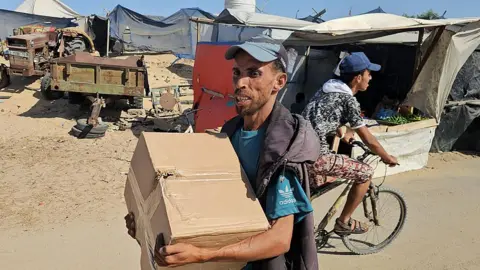 AFP
AFPA controversial new aid distribution group backed by the US and Israel has begun working in Gaza.
The Gaza Humanitarian Foundation said lorry loads of food had been delivered to secure sites on Monday and that distribution had begun. Hundreds of Palestinians collected food parcels from a site in southern city of Rafah on Tuesday.
The GHF, which uses armed American security contractors, aims to bypass the UN as the main supplier of aid to the 2.1 million people in Gaza, where experts have warned of a looming famine after an 11-week Israeli blockade that was recently eased.
A UN spokesman said the operation was a “distraction from what is actually needed” and urged Israel to reopen all crossings.
The UN and many aid groups have refused to co-operate with GHF’s plans, which they say contradict humanitarian principles and appear to “weaponise aid”.
They have warned that the system will practically exclude those with mobility issues, force further displacement, expose thousands of people to harm, make aid conditional on political and military aims, and set an unacceptable precedent for aid delivery around the world.
Israel says an alternative to the current aid system is needed to stop Hamas stealing aid, which the group denies doing.
In a statement sent to journalists on Monday night, GHF announced that it had “commenced operations in Gaza” and delivered “truck loads of food to its Secure Distribution Sites, where distribution to the Gazan people began”.
“More trucks with aid will be delivered [on Tuesday], with the flow of aid increasing each day,” it added.
Handout photos showed three lorries laden with pallets of supplies at an unspecified location and just over a dozen men carrying away boxes.
The BBC has asked the GHF how many lorry loads of aid got in and how many people were able to pick up aid, but it has not yet received a response.
On Tuesday, the Israeli military said in a statement that two distribution sites located in the Tal al-Sultan neighbourhood of Rafah and the Morag Corridor, which separates the city from the rest of Gaza, had begun operating and distributing food to thousands of families.
Hundreds of Palestinians were seen queueing at the site in Tal al-Sultan, where food parcels were handed out by Palestinian workers.
“We stood in a long queue. We did not deal with the Israeli army or any American staff,” one recipient told a local journalist.
A Palestinian working with one of the local companies involved in the operation told the BBC that “dozens of Palestinian workers from three Palestinian companies are overseeing the distribution process, which runs daily from 09:00 to 19:00”.
The employee, who requested anonymity as he was not authorised to speak to the media, added: “The distribution is co-ordinated with five American security personnel, who are present on-site, but there are no Israelis involved in the process.”
But many Palestinians stayed away from the sites.
A displaced woman from the neighbouring city of Khan Younis expressed concern about having to cross Israeli military lines to collect aid from the GHF’s sites.
“We have no idea what awaits us there – whether we will return or be lost forever. We are being forced to risk our lives just to feed our children,” she told BBC Arabic’s Middle East Daily radio programme.
A man who was still living in Khan Younis despite an Israeli evacuation order said he would “refuse to accept American aid under these terms”, and warned that it marked the beginning of a “broader strategy of displacement”.
When asked to comment on the GHF’s work by reporters in Geneva, a spokesman for the UN Office for the Co-ordination of Humanitarian Affairs (OCHA), Jens Laerke, said: “We do not participate in this modality for the reasons that we have given.”
“It is a distraction from what is actually needed, which is the reopening of all the crossings into Gaza, a secure environment within Gaza, and faster facilitation of permissions and final approvals of all the emergency supplies that we have just outside the border,” he added.

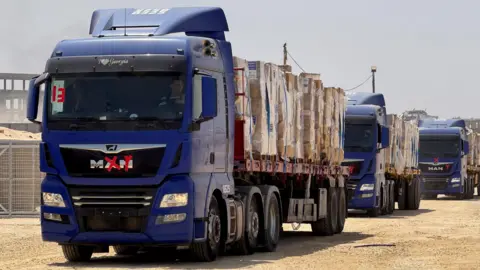 Gaza Humanitarian Foundation/Handout via Reuters
Gaza Humanitarian Foundation/Handout via ReutersUnder the GHF’s mechanism, Palestinians must collect boxes containing food and basic hygiene items for their families from four distribution sites in southern and central Gaza.
The sites will be secured by American contractors, with Israeli troops patrolling the perimeters. To access them, Palestinians were expected to have to undergo identity checks and screening for involvement with Hamas.
UN and other aid agencies have insisted they will not co-operate with any scheme that fails to respect fundamental humanitarian principles.
Jan Egeland, secretary general of the Norwegian Refugee Council and a former UN humanitarian chief, has described the GHF as “militarised, privatised, politicised”.
“The people behind it are military – ex-CIA, ex-security people. There is a security firm that is going to work closely with one party to the armed conflict, the Israel Defense Forces,” he told the BBC on Monday. “They will have some hubs… where people will be screened according to the needs of one side in this conflict – Israel.”
“We cannot have a party to the conflict decide where, how and who will get the aid,” he added.
On Sunday night, Jake Wood resigned as the GHF’s executive director, saying the group’s aid distribution system could not work in a way that would be able to fulfil the principles of “humanity, neutrality, impartiality, and independence”.
The GHF’s board rejected the criticism, accusing “those who benefit from the status quo” of being more focused on “tearing this apart than on getting aid in”.
It said the system was fully consistent with humanitarian principles and would feed a million Palestinians – just under half the population – by the end of the week.
John Acree, a former senior manager at USAID – the US government agency responsible for administering foreign aid – has been named interim executive director.
Hamas has warned Palestinians not to co-operate with GHF’s system, saying it would “replace order with chaos, enforce a policy of engineered starvation of Palestinian civilians, and use food as a weapon during wartime”.
GHF’s statement alleged that Hamas had also made “death threats targeting aid groups supporting humanitarian operations at GHF’s Safe Distribution Sites, and efforts to block the Gazan people from accessing aid at the sites”.

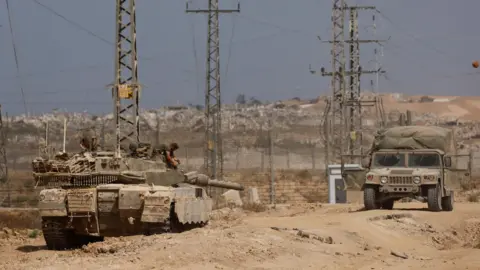 Reuters
ReutersIsrael imposed a total blockade on humanitarian aid to Gaza on 2 March and resumed its military offensive two weeks later, ending a two-month ceasefire with Hamas.
It said the steps were meant to put pressure on the armed group to release the 58 hostages still held in Gaza, up to 23 of whom are believed to be alive.
On 19 May, the Israeli military launched an expanded offensive that Prime Minister Benjamin Netanyahu said would see troops “take control of all areas” of Gaza. The plan reportedly includes completely clearing the north of civilians and forcibly displacing them to the south.
Netanyahu also said Israel would temporarily ease the blockade and allow a “basic” amount of food into Gaza to prevent a famine, following pressure from allies in the US.
Since then, Israeli authorities say they have allowed at least 665 lorry loads of humanitarian aid, including flour, baby food and medical supplies, into Gaza.
However, the head of the UN’s World Food Programme warned on Sunday that the aid was only a “drop in the bucket” of what was needed in the territory to reverse the catastrophic levels of hunger, amid significant shortages of basic foods and skyrocketing prices.
Half a million people face starvation in the coming months, according to an assessment by the UN-backed Integrated Food Security Phase Classification (IPC).
Israel launched a military campaign in Gaza in response Hamas’ cross-border attack on 7 October 2023, in which about 1,200 people were killed and 251 others were taken hostage.
At least 54,056 people have been killed in Gaza since then, including 3,901 over the past 10 weeks, according to the territory’s Hamas-run health ministry.
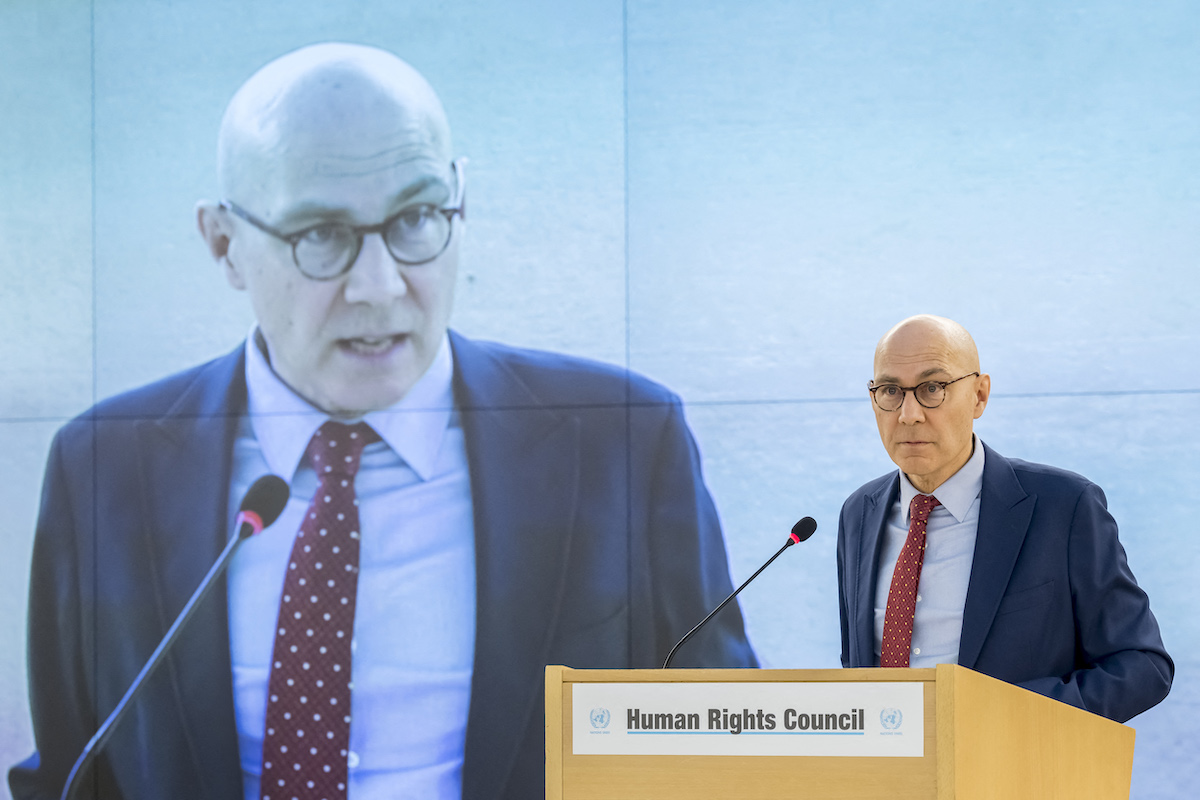
UN Human Rights Commissioner Volker Turk today accused Israel of inhumanity in its military operations in Gaza, describing the situation in the Palestinian territory as “catastrophic” and calling for urgent international intervention.
In an interview with Austria’s public broadcaster O1, Turk said Israel’s conduct in Gaza in recent months “no longer has anything to do with respect for fundamental principles of humanity.”
“It is very clear that we must talk to the current Israeli government very, very strongly and exert pressure to ensure that these serious violations of international law do not occur,” Turk said.
The UN official expressed alarm over what he described as the mass and repeated displacement of civilians in Gaza. He criticised Israel’s designation of large swaths of the territory as military zones.
Israeli army controls 77% of Gaza: Media office
“About 80 per cent of the territory of the Gaza Strip is now military areas where people are not allowed to stay,” Turk said. “There are no more words to describe it.”
The commissioner’s remarks follow a 16 May news conference in Geneva where he accused Israel of pursuing policies amounting to ethnic cleansing.
“It looks like a push for a permanent population transfer in Gaza that disregards international law and amounts to ethnic cleansing,” he said at the time.
Turk cited continued Israeli bombardments, destruction of neighbourhoods, and the blockade of humanitarian aid as factors contributing to further displacement and humanitarian suffering in the enclave.
“We have to stop this madness,” he said.
Israel has denied allegations of ethnic cleansing and maintains that its military actions are in response to security threats posed by Hamas and other resistance factions operating in Gaza.
Israel’s genocidal bombing campaign in Gaza has displaced millions of Palestinians and drawn increasing international concern, with humanitarian agencies warning of worsening conditions for civilians as famine sets in.
The Israeli occupation army, rejecting international calls for a ceasefire, has pursued a brutal offensive against Gaza since October 2023, killing more than 54,000 Palestinians, most of them women and children.
Ahmed is a 16-year-old gymnast who lost both his legs in an Israeli attack on Gaza.
Source link
This documentary short explores the life and times of the filmmaker’s Palestinian grandparents, Naim Azar and Wadee’a Aghabi , and the consequences they suffered in Jaffa because of the Nakba, the ethnic cleansing of Palestinians by Zionists in 1948.
Their lives are recounted through the oral testimonies of the couple’s three daughters and other relatives. The film weaves together personal memories to depict a couple’s life before their expulsion—and the lasting impact of displacement on their family.
A film by Najwa Najjar.
Published On 27 May 202527 May 2025
Video shows a severe dust storm turning an Australian town orange as strong winds whip across South Australia
Source link
A man has been charged with attempted murder after a police officer was critically injured after being hit by a car.
PC Christopher Miller, 38, has been in hospital with life-threatening injuries since the incident on the B416 in Stoke Poges, Buckinghamshire on Thursday night.
Thames Valley Police arrested two men, aged 28 and 38, from Slough, Berkshire, on suspicion of attempted murder and causing serious injury by dangerous driving.
Simranjit Kajla, 28, has now been charged with attempted murder, the force confirmed on Tuesday.
He has also been charged with causing serious injury by dangerous driving, driving whilst disqualified and using a motor vehicle on a road without insurance.
Mr Kajla is scheduled to appear at Reading Magistrates’ Court on Tuesday.